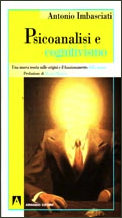
Psychoanalysis and Cognitivism: a new Theory for Psychoanalysis
Freud, in describing his fundamental discoveries on human psyche also wanted to explain them. In this explanatory intent, he outlined a general theory of mental functioning, the Energy-and-Drive Theory which he called Metapsychology. This theory was drawn up on the basis of the sciences at the end of the nineteenth century. Today the development of experimental psychology and neuroscience provides a picture of the mind that can no longer reconcile with the Freudian Metapsychology. By confusing Freudian discoveries with his theory, some today wonder if Freud should be considered dead. Therefore, psychoanalysis stands relatively isolated in the current scientific context.
In this book Imbasciati presents the last point of his Theory of the Protomental which has already been partly outlined in some of his previous books. This theory aims to provide a new metapsychology that can explain the mental functioning described by psychoanalysis in agreement with the current other sciences of the mind. Focus of this new theory is on processing, organisation and construction of the traces of implicit memory that structures itself already from the fetal stage and constantly develops into learning from progressive experience throughout life.
This new “metapsychology” is quite revolutionary compared to traditional psychoanalysis: the concepts of drive and repression are set aside and the concept of the unconscious changes, though it remains the basis of every mental event and all human behaviour.
